
臺灣非營利專業書評媒體。Openbook編輯部將提供原生報導,文化觀察,人物採訪與國內外重大出版消息。 https://linktr.ee/openbooktaiwan
Taking readers to the scene" "How to save a book when I am sick? An in-depth tour of the Taiwan Library Hospital" activity side notes
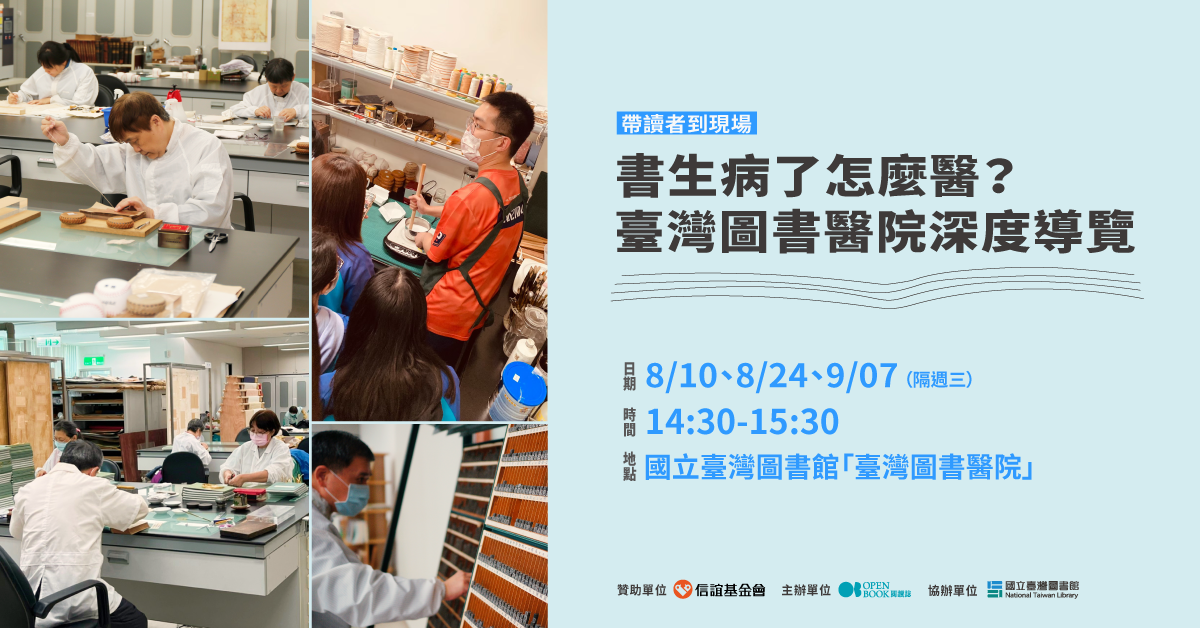
Written by the OB Commissioner on a sunny afternoon yesterday (8/10), the first "Taiwan Book Hospital In-depth Tour" event hosted by OPENBOOK and sponsored by the Xinyi Foundation started smoothly and ended successfully.
In addition to writers and young college students with thoughtful eyes, the event participants also included curious children, beautiful mothers who came with them, and neat women. After gathering from the first floor of the Taiwan Library, we walked to the library hospital on the fifth floor step by step.
As soon as you enter the space, you can see professional book restorers and volunteers in white robes, sitting at different positions on the large tabletop, concentrating on the work in front of them. The old-looking, dark-colored, torn pages were spread out on the mat. The restorers and volunteers pressed paper against the corners. In front of them was a saucer filled with paste. With brushes in hand, they carefully smeared on the paper.
Today's tour guide first took us to understand paper. "Books need to be repaired with the closest paper to this book, so if we work here, knowing paper is a very important task."
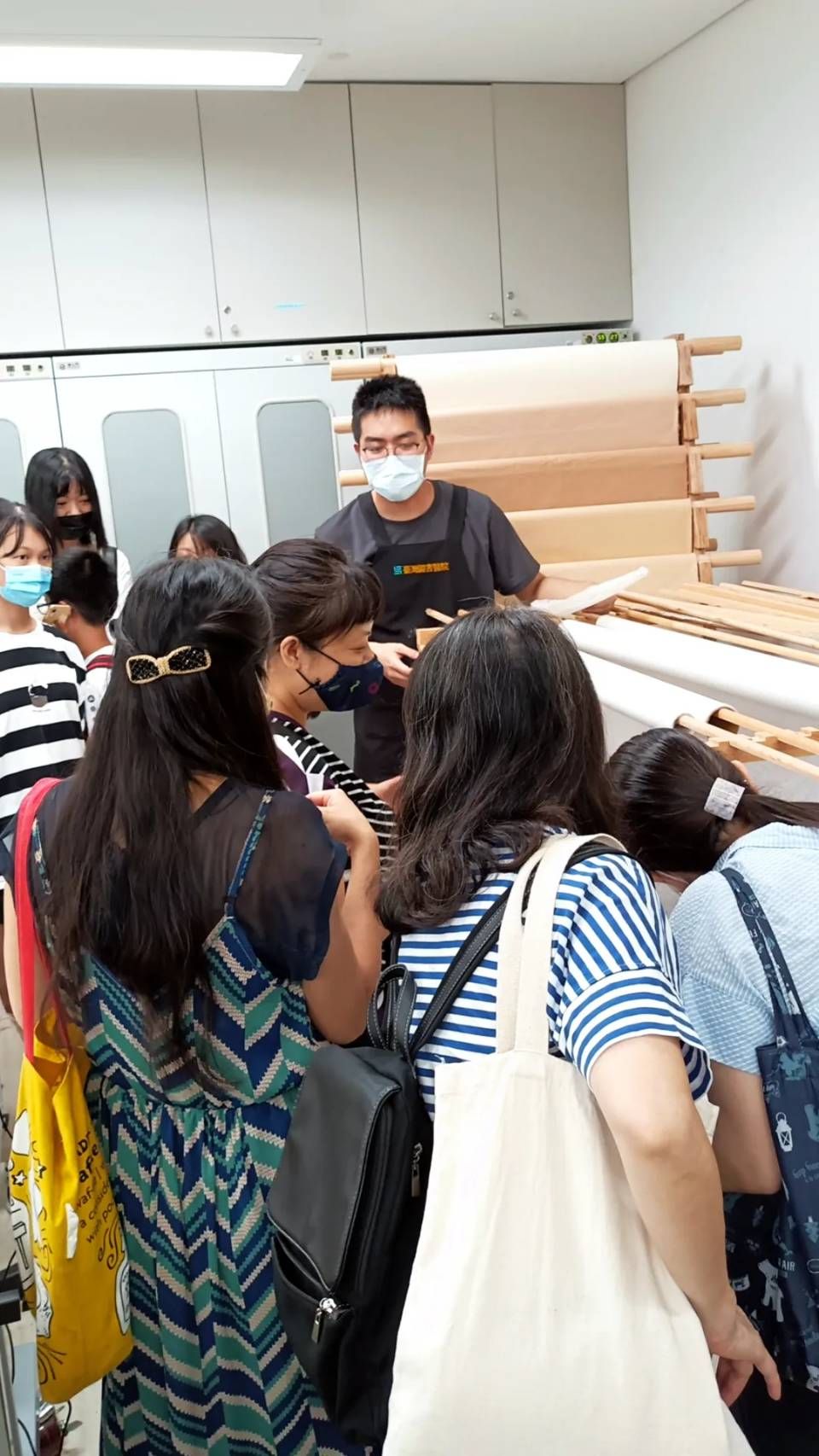
When he asked everyone, what is the biggest difference between machine-made paper and hand-made paper? A visitor quickly replied: "Fiber." The tour guide showed a satisfied smile. He shared that the more consistent the material requirements for the paper used for repairing books, the better, but the color is usually lighter than the original paper, not the same paper. The reason is that over time, 10, 20, or even 50 years later , the newly supplemented paper will be close to the original book.
He also displayed a paper as thin as a cicada's wings, which is handmade from Japan and made of mulberry tree as a raw material. He asked us to guess, why is such paper important? Because when repairing books, thicker paper will directly cover the ink writing on the ancient books. Such thin paper is best used when repairing books with text on both sides. He also said that the roll of paper we are seeing now costs 30,000 yuan a roll, causing everyone to exclaim.
With the guide, we visited the paper developed in different eras, movable type stands (types used for letterpress printing), bronzing machines, book presses, and even deworming Chinese herbal medicines prepared for different bookworms.
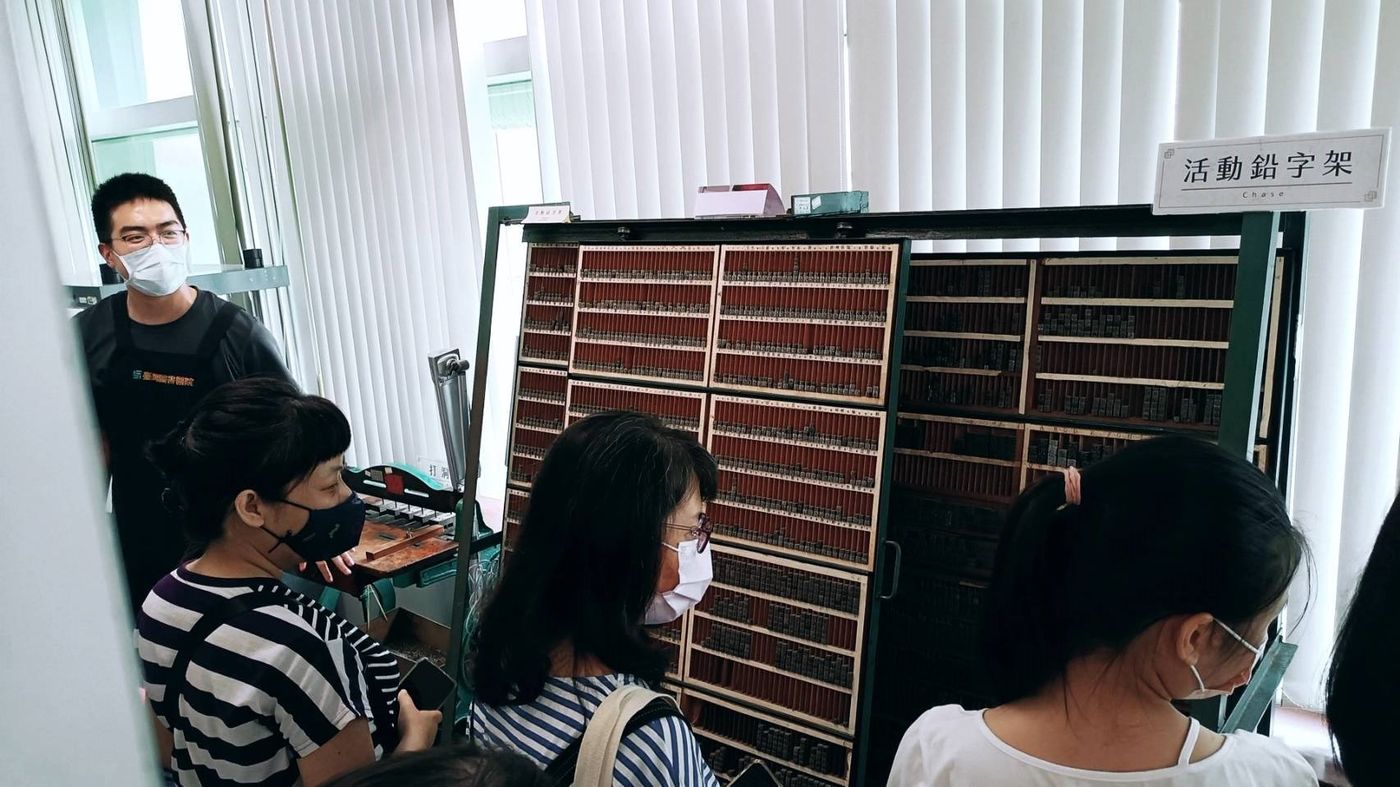
The OB commissioner asked: Which Chinese herbal medicine is the most afraid of bookworms? Both librarians mentioned peppercorns first! (The second one also mentioned star anise) However, it is added that the effect of medicinal materials varies with insects, and it is also reminded that it is best to change the Chinese herbal medicines for deworming after a while, "Otherwise, the insects will get used to the smell and will not be able to drive away. Yes." Everyone laughed.
The guide said that the most suitable environment for storing books is low temperature, dry and away from sunlight. This is different from the general impression that "baking books can help preserve books", the guide explained: "The main purpose of drying books in ancient times was to repel insects, but in fact, books exposed to too much ultraviolet rays will also be damaged. Exposure to the sun is not recommended." In addition to natural aging, the pulp of paper itself contains undesirable substances, such as hemicellulose, lignin, acid, chlorine, bleaching powder and other harmful substances, which will also prevent books from being stored for a long time.
One of the most interesting stops is to make batter. Watching the sticks like noodle sticks stirring continuously in the container, I have the illusion of coming to the cooking classroom, but it is actually very laborious to stir. The OB commissioner asked the tour guide that he had seen a Japanese amateur repair a damaged book according to an expert’s video and technical reference book, and finally put the paste into the mold and ate it with the ingredients. Is the paste really edible? ? The tour guide said: "Yes, but it may not taste good if you eat it directly." In addition to being able to mix the experience by hand, the tour guide also prepares a certain amount of paste, which is packaged for visitors to take home. An indescribable warmth and humor!
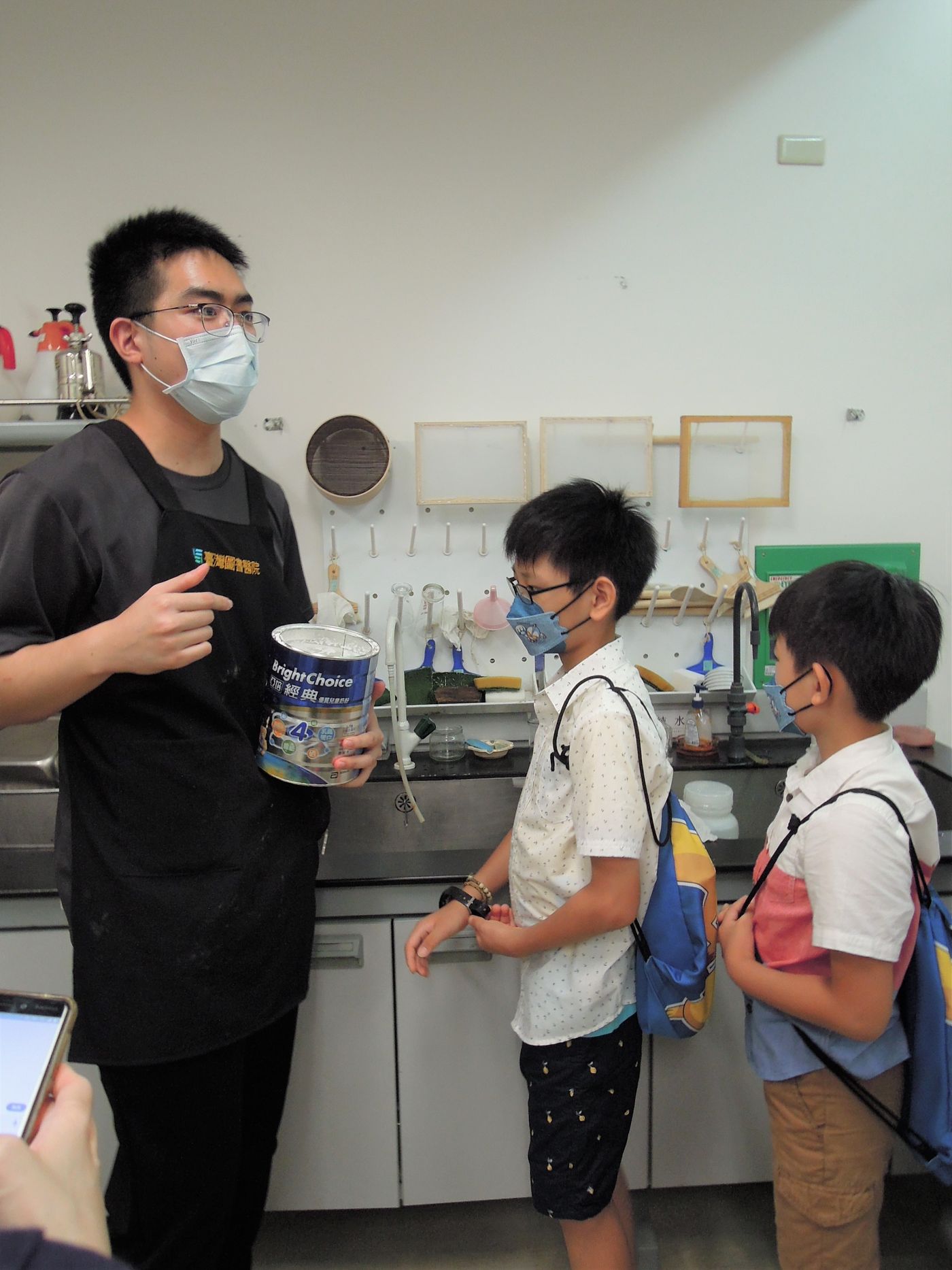
After the guided tour, Xu Meiwen, the head of the library hospital, let us watch the Quran she was restoring, which may have been born in 1619. She said that from this "Koran", we can see that in an era of poor materials, devout people copied it separately, resulting in different paper conditions, different colors, and different handwriting in the same book. Before repairing, it must be cleaned with a brush, or scraped with a knife and fine sandpaper to remove the worm excrement and dirt on the edge of the hole, so that the fibers are exposed around the hole, and then transplant the repair paper. She was doing cleaning work, and the OB commissioner was also moved by the patient and glowing expressions of the visitors. In addition to being able to watch the process of restoring the Koran up close, the visitors also got a special small prize at the end, which is really worth watching and winning!
Sincere thanks to the Xinyi Foundation for the sponsorship, and all the staff of the Taiwan Library Hospital for their attentive and detailed tours. Hope all the participants are happy and happy! ♡(*´∀`*)People(*´∀`*)♡●
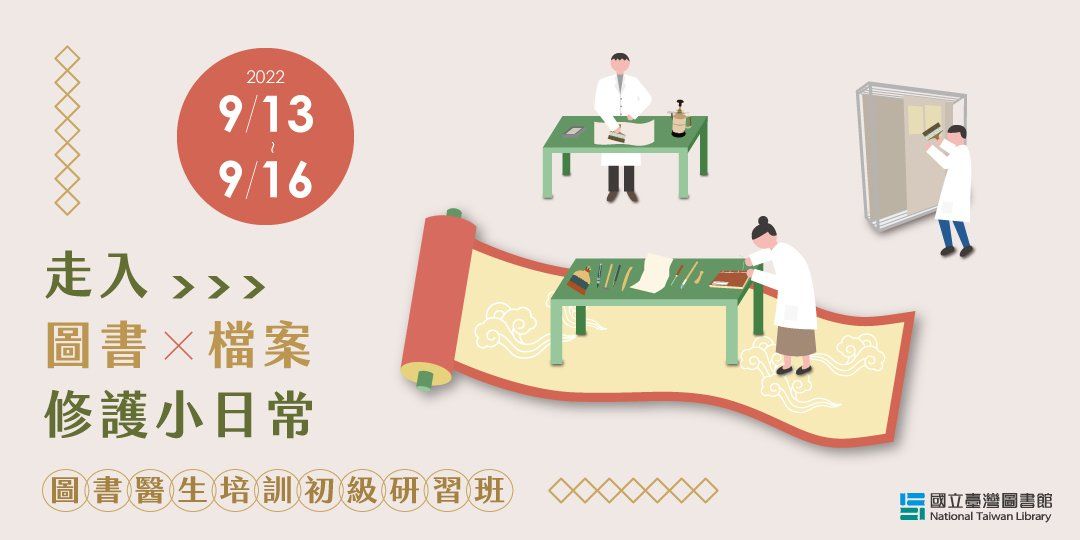
Into the daily life of books and archives maintenance - primary workshop for library doctor training
Study time|111/9/13(Tuesday)~9/16(Friday), a total of 4 days of class Location|Room 4045, 4th Floor, National Taiwan Library (No. 85, Zhongan Street, Zhonghe District, New Taipei City, August 23 Memorial Park/ In Park No. 4)
For detailed information and registration methods, please visit the official website of the ROC Library Association.
Like my work?
Don't forget to support or like, so I know you are with me..
Comment…